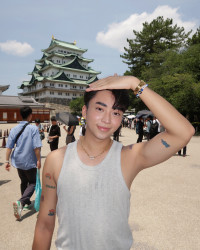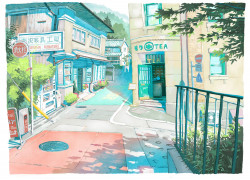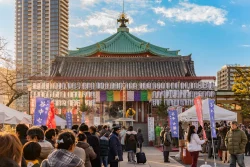
October 1, 2009
That Man’s World
Shu Matsui bares the prejudices of contemporary Japan—before an international audience
By Metropolis
Originally published on metropolis.co.jp on October 2009

©Tsukasa Aoki
Lacking the time to finish an original work before the inaugural Festival/Tokyo performing arts omnibus this spring, young playwright Shu Matsui decided to light things up instead. Matsui’s production of German playwright Marius von Mayenburg’s Fireface portrays a dysfunctional family whose pyromaniac son sets fire to the house and kills his parents. This attack occurs after his sister, with whom he’s having an incestuous relationship, finds a new boyfriend.
In an interview at Festival/Tokyo’s headquarters at a disused high school in Nishi-Sugamo, now re-christened Nishi-Sugamo Arts Factory, Matsui says that while the subject matter was dark, he didn’t want it to overwhelm the performance.
“I chose it because it portrays a family that is breaking apart, and the Japanese family is also under pressure,” he explains. “But as I directed the production, I began to feel that even though it’s dark, there are times when the characters experience happiness. I wanted the actors to express this, because human beings are, after all, complex, and they experience varied emotions.”
A keen sense of ambiguity lurks behind Matsui’s acclaimed productions, and also provides the context for the name of his theater company, Sample. “In the way that people may enjoy cosplay, actors create tension by donning costumes, by ‘sampling’ different aspects of themselves,” he says.
Born in Tokyo in 1972, Matsui entered the influential Seinendan company as an actor in 1996. He continues to appear onstage, but in recent years has achieved growing renown as a playwright for his explorations of the mental landscape of contemporary Japan. His 2008 play Kazoku no Shouzou (“Portrait of a Family”) was nominated for the Kunio Kishida Drama Award.
For his first-ever piece to be shown with English subtitles—a rarity for any Japanese director—Matsui presents Ano Hito no Sekai (“That Man’s World”) at the fall segment of Festival/Tokyo. The play follows the story of a directionless loner in rural Japan who searches for meaning in surrealistic ceremonies, and a woman with whom he has a failed relationship.
“The story is about people whose prejudices prevent them from being able to interact,” Matsui says, measuring every word. “For this reason, I really want foreigners to see the play, because part of it deals with racial prejudices. Living in Japan, there aren’t many chances to confront one’s prejudices, so they remain taboo and hidden. Most Japanese—and this character—can’t express or understand their prejudices. So he doesn’t meet his prejudices head on, but has strange experiences—such as of a cult religion, or self-realization seminars—that bring them to the fore.
“The larger theme is coexistence,” Matsui continues. “There are misunderstandings, difficulties in human relations. But I believe in the possibility of coexistence. And in order to overcome our prejudices it’s necessary for people to meet. Amid our information society, the strong point of theater is that it provides a place for people to actually meet face-to-face.”
Despite his growing acclaim, Matsui prefers the immediacy of theater to the mass media of television and film. “The good point of the contemporary Japanese theater scene is that young people are performing in various contexts and are not limiting themselves to traditional theaters. People are overturning established conventions,” he says. “The bad point—myself included—is that we are not good at promoting and sustaining careers. Compared to music or art, theater is not very popular. It’s not part of education—it’s not considered an essential part of culture. So we creators have to try to make it more widely understood, and to make something relevant.”
Matsui’s That Man’s World will be one of 20 Festival/Tokyo performances centered around Ikebukuro’s Tokyo Metropolitan Art Space, Owlspot Theater and nearby Nishi-Sugamo Arts Factory. Ranging from Chris Kondek’s topical examination of the financial crisis, Dead Cat Bounce, to a restaging of butoh company Sankai Juku’s classic Unetsu, the festival also shows its ambitions to reach an international audience by presenting Japanese productions with English subtitles.
The chance to see a work from Japan’s “small theater” (shogekijo) scene in English is a rare one indeed, and by choosing a play that deals with prejudice, the unassuming Matsui has grasped the bull by its horns. Let’s hope he isn’t gored.
That Man’s World
Shu Matsui play with English subtitles. Nov 6-15, various times, ¥3,000 (student)/¥3,500. Tokyo Metropolitan Art Space, Ikebukuro. Tel: 03-5391-2111.







